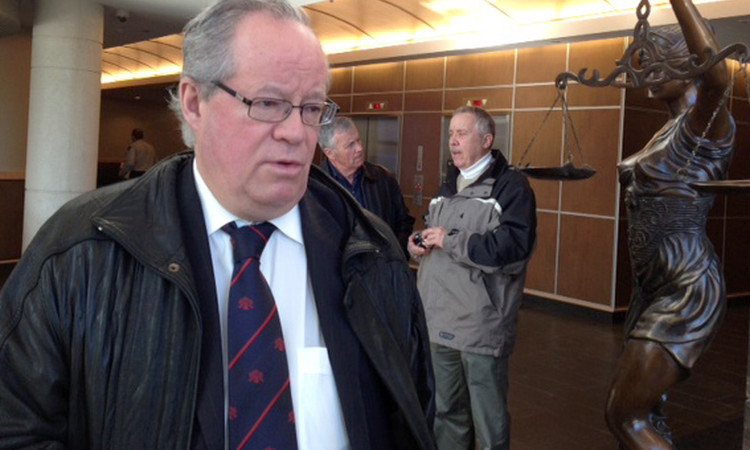 Judge reserves decision in unusual estate case
Judge reserves decision in unusual estate case
JENNIFER PRITCHETT Telegraph-Journal
January 28, 2014
Photo: Jennifer Pritchett/Telegraph-Journal
SAINT JOHN – A Court of Queen’s Bench judge has reserved his decision on whether a Saint John man’s will is legal and can bequeath about $250,000 in rare coins and antiquities to an American neo-Nazi group.
Harry Robert McCorkill left his estate to the National Alliance when he died in 2004. A decade later, his sister, some rights groups and the province of New Brunswick went to court to prevent the money from flowing to the white supremacist, anti-Semitic organization.
The trial into the matter, held Monday and Tuesday, saw lawyers from both sides make arguments in an unusual legal case that weighs peoples’ individual right to leave their estate to whomever – and whatever type of organization – they choose against the court’s ability to intervene in special circumstances that are deemed against “public policy.”
There’s little case law on the subject and in many ways, the debate around the McCorkill estate is unique and breaks new legal ground.
Dan Delaquis, a lawyer for the Centre for Israel and Jewish Affairs, told the court Tuesday that the gift, if it’s permitted to stand, will be “detrimental to the Jewish community” and will result in an erosion of Canadian values because the National Alliance has a mandate of hate and is a well-known white supremacist group.
“We submit in this case that the public interest must outweigh the wish of Mr. McCorkill,” he said.
Marc-Antoine Chiasson, a lawyer for Isabelle Rose McCorkill, argued that one need only look at the National Alliance’s own handbook to see firsthand how it purports a racist message.
He read excerpts of the small handbook in court on Monday, highlighting how it points to “white” living spaces with white schools and residential areas with the overall view to create a white world.
Chiasson also pointed to the words of National Alliance founder William Luther Pierce and described his books, Hunter and The Turner Diaries, which were written under the pseudonym “Andrew Macdonald,” as repugnant.
But Andy Lodge, a lawyer for the Canadian Association for Free Expression (CAFE), told the court Tuesday that the fact that an organization may be considered “morally reprehensible” should have no impact on whether it can be a beneficiary of an estate. He pointed out that there are no laws prohibiting even a serial killer or a drug dealer to receive assets from a will.
For the court to evaluate whether a beneficiary such as the National Alliance is against “public policy,” he argued, would open “Pandora’s box.”
He said it would do more harm than good if the courts started assessing a beneficiary’s past or try to predict how they would spend the money they receive from a will.
Lodge described the court debate over McCorkill’s will as an “exercise in futility.” He argued there is no legal basis to challenge the will because it’s valid, follows New Brunswick’s Wills Act and contains no words that are contrary to Canada’s public policy.
The lawyer said he knows of no law that would prohibit a living person in Canada from giving money to the National Alliance.
John Hughes, the lawyer for the executor of the estate Fred Streed, argued that the application to prevent the disposition of McCorkill’s estate to the National Alliance should be dismissed.
Isabelle McCorkill didn’t attend the trial in Saint John nor did any representative from the National Alliance, a West-Virginia based organization.
Chiasson, her lawyer, has said that the legal battle over her brother’s estate has never been about the money, but rather, about preventing it from going to a neo-Nazi group.
Catherine Fawcett, who represents the League for Human Rights of B’nai Brith Canada, also argued that the gift to the National Alliance is “completely against public policy” and pointed to the connection between hate propaganda and violence.
McCorkill’s estate includes, among other items, a collection of hundreds of Greek, Roman, and Italian coins – some dating back to 525 BC – that he amassed since the 1970s. Some items were once displayed at the University of Saskatchewan’s Antiquities Museum and a release from that institution in 1997 described him as a well-travelled collector and a chemist who spent time at MIT and the Smithsonian Institution.
Little else is known about the man or why he lived in Saint John, where he moved about a year before his death. He lived quietly in a townhouse in Millidgeville and after he died at home in 2004, his body remained at the Saint John Regional Hospital for nearly two weeks while the authorities tried to track down his next of kin.
The National Alliance paid for his funeral and hired Malcolm Ross and William Ross of Moncton to transport, store and take inventory of his assets.
Malcolm Ross, who attended McCorkill’s court hearing in Saint John on Tuesday with his brother, was the focus of a 1996 Supreme Court ruling that found that the former Moncton-area teacher whose off-duty writings claimed Christians were under attack by an international Jewish conspiracy, had in fact “poisoned” the educational environment. The ruling upheld a human rights board of inquiry that ordered Ross into a non-teaching job.
Outside court, he told the Telegraph-Journal that he was there to “observe,” but declined to comment on his connection to the McCorkill matter.
